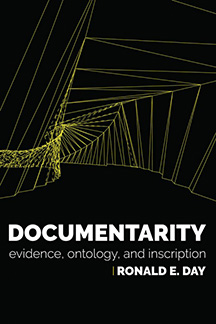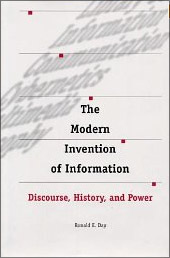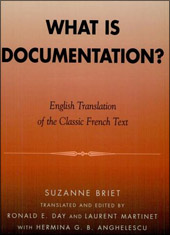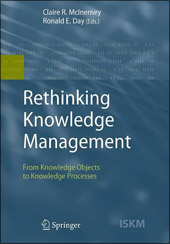scholarly books
 Click here for Open Access Link |
Documentarity: Evidence, Ontology, and Inscritption (2019) In this book, Ronald Day offers a historical-conceptual account of how something becomes evident. Crossing philosophical ontology with documentary ontology, Day investigates the different genres, technologies, modes of inscription, and innate powers of expression by which something comes into presence and makes itself evident. He calls this philosophy of evidence documentarity, and it is through this theoretical lens that he examines documentary evidence (and documentation) within the tradition of Western philosophy, largely understood as representational in its epistemology, ontology, aesthetics, and politics.
|
 Best Information Science Book of the Year Award 2015 The Association for Information Science and Technology (ASIS&T) |
Indexing It All: The Subjects in the Age of Documentation, Information, and Data (2014) In this book, Ronald Day offers a critical history of the modern tradition of documentation. Focusing on the documentary index (understood as a mode of social positioning), and drawing on the work of the French documentalist Suzanne Briet, Day explores the understanding and uses of indexicality. He examines the transition as indexes went from being explicit professional structures that mediated users and documents to being implicit infrastructural devices used in everyday information and communication acts. Doing so, he also traces three epistemic eras in the representation of individuals and groups, first in the forms of documents, then information, then data.
|
 |
The Modern Invention of Information: Discourse, History, and Power (2001)This book investigates the conceptual and rhetorical underpinnings of three "information ages" in Europe and the U.S. through the 20th century in order to understand the relation between information, rhetoric, politics, and culture during that period and into our own. The book engages the texts of figures in information science and social theory such as Paul Otlet, Suzanne Briet, Norbert Wiener, Warren Weaver, Pierre Levy, Martin Heidegger, and Walter Benjamin. The book's main theme is about how a common conception and rhetoric of "information" has leveraged modern history, culture, and society toward being an "information" age, culture, and society.
|
 |
What is Documentation?: English Translation of the Classic French Text (2006)Below are links to Briet’s book (translated by Ronald E. Day (Indiana University) and Laurent Martinet (Paris), with Hermina Anghelescu (Wayne State University) and to the preface and commentary on that text, as well as to Michael Buckland’s biography of Briet and his selected bibliography of her works. |
 |
Rethinking Knowledge Management: From Knowledge Artifacts to Knowledge Processes. (2007) |


